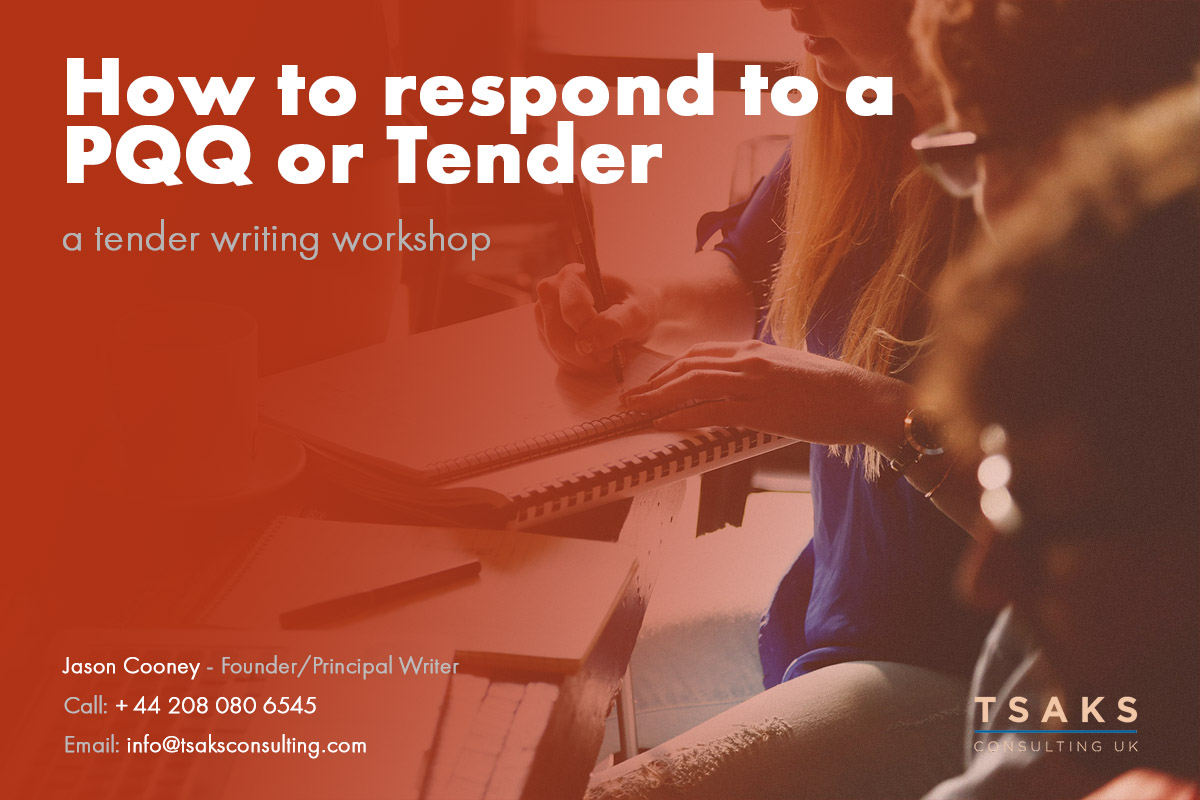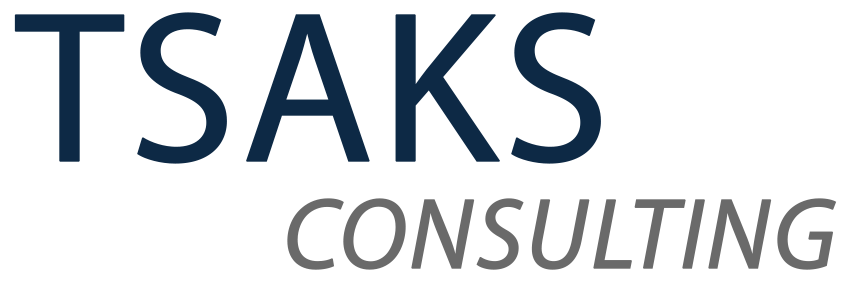 How to respond to a PQQ or Tender in the UK – A tender writing workshop
How to respond to a PQQ or Tender in the UK – A tender writing workshop
At Tsaks Consulting, we help business across the UK writing winning bids and tenders. We also conduct proposal workshops for customers and clients large and small, and from all industries.
Over the years we have amassed loads of information and put together informative content. Below is a summary of tips, techniques and examples that we generally cover in our tender workshops. These will give you a framework for responding to PQQs, RFP, RFT and the like and to boost your chances of success.
Bid / No Bid
This is the first big decision in the tender process. You need to decide whether the opportunity is worth the time and effort to put in a quality bid. We have a checklist in place which we can send through to you if you contact us, but as a summary you should consider:
- If you have a relationship with the client
- If you have serviced similar clients (for example, if it’s a government client, do you have similar government clients)
- Do your services align to the opportunity
- Are you able to put in a quality bid.
The fourth point if critical. When we hold our tender and bid writing workshops, many of our attendees say that ‘you have to be in it to win it’ and ‘we will fill it in and see what happens’. The reality is with any proposal, you need to put forward a quality submission in order to be selected.
Getting organised
With any tender or bid it’s important to get off to a good start. If you are preparing a PQQ, or putting forward a proposal, the first thing you need to do is to get organised. Review the tender criteria and allocate responsibilities and accountabilities. It’s usually best that you have one resource coordinating the bid, (unless it’s a very large infrastructure project or highly complex bid) and ensuring they are empowered to run it. Where you are consulting SMEs, they need to be noted and deadlines provided for their input.
Staying organised will ensure you can track your progress on the tender or proposal. In our bid writing workshops, we usually five out examples of tender and examples of PQQs for each of the attendees. We ask them to create a tender checklist and schedule (again we have templates, so contact the Tsaks Consulting team for a copy). What we find is that getting organised is important, but staying organised is critical.
It doesn’t matter if you are a law firm in Central London submitting a bid, or a concreting and excavation company in Birmingham submitting a local government tender, the reality is that bids become complex quickly. There is often an extensive amount of supporting documentation and lots of moving parts. Take stock, get organised, stay organised and you will be tracking fine.
Managing Internal Stakeholders
This is always a hot topic of discussion at our bid writing workshops. It’s one of those aspects of the tender preparation process that is essentially out of your control. Be it political powerplays or simply being busy, the reality is that sometimes internal stakeholders simply won’t deliver what you require on time. There’s no silver bullet solution for this, however, we do have a few tips on how to manage it.
Firstly, keep the bid progressing. Just because you haven’t responded to one question, it doesn’t mean you should stop the bid altogether. Progress the other areas so you aren’t stuck on all areas at the last minute.
Secondly hold draft review meetings. This is useful to track people’s progress and put a bit of informal pressure on those who do not complete their respective areas.
Finally, put in buffers for the due date. If it’s due on the 15th of April, buffer in a few days to review and edit the response and give the stakeholders a due date of the 13th of April. Printing time is another great reason.
Developing Win Themes
Another topic that always results in a fairly robust discussion at our bid writing courses is win themes. It’s all about the way you look at it. For example, we usually provide attendees an example of a bid or a company and situation and ask them to come up with the win themes. Win themes are key selling points for your bid and it’s important to focus on the outside in. That means considering the larger market, the client and how you fit in.
For example, let’s assume you are an IT company based in the Manchester. You may specialise in managed services and hosting. If you are pitching to a Government client, you they may only be looking for managed services and they might be highly service focused. This will probably shine through in the tender. Your competitors bay be highly technical and have limited service capability.
It’s clear in this situation that your win themes will more than likely be around service. However, if you didn’t consider the client, what they were looking for, and how you fit in in the competitive landscape, the win themes you develop may be different.
It’s equally important to intertwine your win themes throughout your tender response. It’s no good simply including them in the executive summary. You need mention the win themes consistently through the document to reinforce the message to the potential client.
Respond Comprehensively
When you are completing a PQQ, Proposal or Bid, it’s tempting to rush through it and tick the boxes. Concise answers are great, however, you still need to respond comprehensively to each question. Providing evidence in the form of attachments and supporting documentation is useful. Remember, if the client has asked you to outline your experience, then a summary as well as a few case studies is a lot more powerful than a quick bullet point list of who you have services and what you have done.
Responding comprehensively also extends to case-studies and CVs. When you are developing a CV for your personnel, ensure you insert details of experience that is relevant to the contract you are looking to secure. For example, if you are a construction company, and you are putting forward your project team, if your proposed project manager has built stadiums as well as residential houses, and you are bidding for a stadium contract, there is no need to focus on their residential construction experience.
About Tsaks Consulting
At Tsaks Consulting, we help businesses writing winning PQQs, Bids, Tenders and Proposals. We help organisations across the UK and are experienced in a broad range of industries including defence, medical, construction, transport, healthcare, agriculture, manufacturing, professional services, legal, accounting and many more. Our tender writing workshops are great for tender writing training and are open to all. Our team of bid writing consultants are always ready to assist with your next tender.
Call today or email your documentation to info@tsaksconsulting.com for a quote and to see how our bid preparation services can benefit you.
